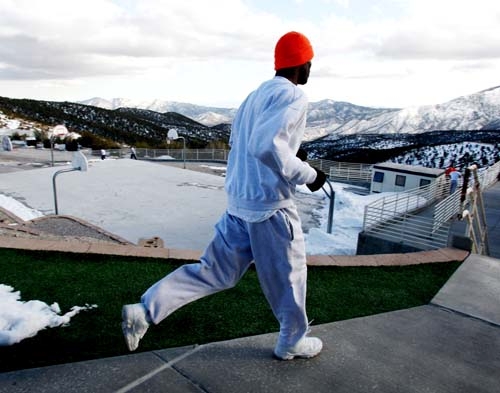Plan would cut back juvenile justice services



Fritz Reese isn’t the type to lock ’em up and throw away the key.
If he were, the director of Clark County Juvenile Justice Services wouldn’t have blinked when Gov. Brian Sandoval’s proposed state budget cut
$7.1 million from the agency, which would gut programs that have reduced incarceration rates by 36 percent since 2004.
Today, as lawmakers and juvenile justice officials meet in Carson City to discuss the budget, Reese said he plans to recommend the governor instead shutter the Elko-based, 160-bed Nevada Youth Training Center, one of two youth offender detention facilities in the state.
He also will ask lawmakers to “reinstate” most of the budget the governor’s proposal cut from a half-dozen programs and agreements designed to reduce the need to warehouse troubled youth.
Fritz said the shuttering of the Elko center is supported statewide by other juvenile justice chiefs, who will plead their case with Sandoval today .
“It would be irresponsible for us to suggest you can’t cut the budget; we can’t just say it’s public safety,” Reese said Tuesday. “We know the governor has to cut. We know the budget is short about a billion dollars, but closing Elko is the better option.”
Fritz bolsters his position with the numbers. It now costs the state Division of Children and Family Services nearly $9 million a year to run the 148-bed Elko facility. And beyond the financial burden is a practical issue based on logistics, Fritz said.
“Elko is too far away for family,” said Reese of the northeast Nevada facility.
Roughly 80 percent of the inmates at the sprawling, aged facility in Elko are from Clark County. The two communities are separated by more than 400 miles, a car trip of more than seven hours. The state’s other youth detention center is in Caliente, which is about 155 miles from Las Vegas.
Caliente has 110 beds for boys and another 40 for girls.
Reese is not worried about losing beds. After all, the goal of the programs he oversees and county judges support is to keep young offenders in their homes, under varying degrees of supervision ranging from being outfitted with a GPS device, to informal probation.
Fernando Serrano, a deputy administrator at the Nevada Division of Children and Family Services, which oversees the state’s youth detention centers, said the division recommended Sandoval keep 250 beds available at the two facilities based on 2010 figures.
“We averaged 247 (inmates) last year,” said Serrano, who said he has heard “a lot of discussion” on what could and could not be cut, but nothing formal.
Sandoval’s proposed cuts include $1.2 million in Community Corrections Partnership Block Grants, which fund “intensive supervision programs.” That would cut five full-time probation officers, two full-time mental health clinicians and four part-time staff members.
The funding is critical to juveniles who leave the Spring Mountain Youth Camp, a staff-secure correctional facility that houses male youths between the ages of 12 and 18. Employees continue to monitor their school work, keep them on track to earning a diploma or GED and meet with them weekly.
Reese said the number of juveniles sent to Elko or Caliente has been reduced by more than 30 percent — 160 youths have avoided detention since 2004 — under this program.
For a cost comparison, he said it costs taxpayers $224 a day to house a juvenile inmate. The cost to supervise them in the community is less than $10 per day.
A key cut proposed by the governor would be $1 million to the Spring Mountain Youth Camp on Mount Charleston, where the average stay is six months and only 12 percent of those who spend time there re-offend compared to the 25 percent recidivism rate for those sent to Elko or Caliente.
The offenders at Spring Mountain also maintain and develop the extensive trail system on the mountain, which Reese described as “the best forestry program in the nation.”
The 100-bed Clark County facility is a 45-minute drive from Las Vegas.
The governor’s proposed $1 million cut represents about 7 percent of Reese’s overall budget for juvenile justice services. If approved, it would compel the county to close a dorm that houses 20 juveniles. Two full-time probation officers and a clinician would lose their jobs at the facility.
Another fact Reese uses to support his proposal: juvenile crime is down. While there are certainly serious and violent juvenile offenders, Reese said the majority of referrals from Las Vegas police involve truancy. Fighting at school ranks second as the most common referral and curfew violations are third.
Contact Doug McMurdo at dmcmurdo@reviewjournal. com or 702-224-5512.












